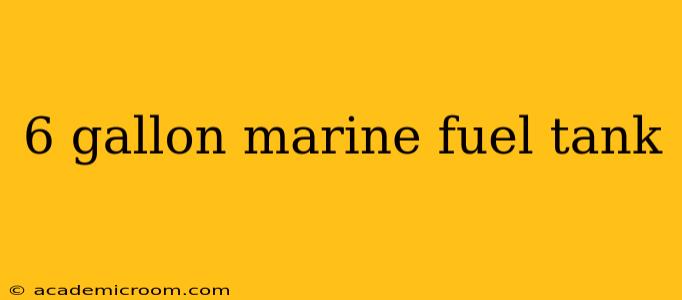Choosing the right fuel tank for your boat is crucial for safety and performance. A 6-gallon marine fuel tank is a popular choice for smaller boats, inflatables, and auxiliary engines, offering a balance between capacity and portability. This guide delves into everything you need to know about selecting and using a 6-gallon marine fuel tank.
What to Consider When Choosing a 6-Gallon Marine Fuel Tank
Several factors influence the ideal 6-gallon marine fuel tank for your needs. Let's explore the key considerations:
Material: What are the different types of 6 gallon marine fuel tanks?
Marine fuel tanks are typically constructed from polyethylene, aluminum, or stainless steel. Each material offers advantages and disadvantages:
-
Polyethylene (PE): PE tanks are lightweight, durable, and resistant to corrosion. They are a popular choice for their affordability and ease of handling. However, they are less robust than metal tanks and can be susceptible to damage from punctures or impacts.
-
Aluminum: Aluminum tanks are stronger and lighter than polyethylene tanks, offering better resistance to impacts. They are also relatively inexpensive, making them a good balance of cost and durability. However, aluminum can corrode over time, especially in saltwater environments, requiring regular maintenance.
-
Stainless Steel: Stainless steel tanks are the most durable and corrosion-resistant option. They offer superior protection against punctures and impacts, ensuring a longer lifespan. However, they are significantly heavier and more expensive than polyethylene and aluminum tanks.
Size and Shape: How much space do I have?
While you're focused on a 6-gallon capacity, consider the tank's overall dimensions. Measure the available space in your boat to ensure a proper fit. Rectangular tanks can maximize space utilization, while portable tanks offer flexibility.
Mounting: How will I secure the tank?
Secure mounting is paramount for safety. Look for tanks with mounting brackets or straps designed for marine applications. Ensure the chosen mounting system is compatible with your boat's structure and can withstand the weight of the filled tank.
Fittings and Accessories: What do I need?
Essential fittings include fuel lines, vents, and a fuel pickup tube. Consider the type of fuel connections compatible with your engine. Some tanks include integrated sending units for fuel gauges, offering convenient monitoring.
Frequently Asked Questions about 6 Gallon Marine Fuel Tanks
Here are some common questions people ask about 6-gallon marine fuel tanks:
How much does a 6-gallon marine fuel tank weigh?
The weight varies depending on the material. A polyethylene tank will be significantly lighter than an aluminum or stainless steel tank of the same capacity. Expect a polyethylene tank to weigh around 5-7 pounds empty, while an aluminum or stainless steel tank could weigh 10-15 pounds or more.
Are 6-gallon marine fuel tanks suitable for all boats?
No, 6-gallon tanks are best suited for smaller boats, inflatables, dinghies, or as auxiliary tanks on larger vessels. Boats with larger engines or longer cruising ranges will require significantly larger fuel tanks.
Where can I buy a 6-gallon marine fuel tank?
6-gallon marine fuel tanks are widely available at marine supply stores, online retailers, and some hardware stores. Check local boating supply shops for options and expert advice.
How do I maintain a 6-gallon marine fuel tank?
Regular maintenance prolongs the lifespan of your fuel tank. Inspect the tank for any leaks or damage. Keep the tank clean and dry when not in use. For aluminum tanks, consider a corrosion inhibitor to prevent oxidation.
What are the safety precautions when using a 6-gallon marine fuel tank?
Always handle gasoline with extreme caution. Ensure adequate ventilation when filling or handling fuel. Never fill the tank completely to allow for expansion. Properly secure the tank to prevent movement during operation. Comply with all relevant safety regulations and guidelines.
Choosing the right 6-gallon marine fuel tank involves careful consideration of your specific needs. By weighing the factors discussed above and selecting a reputable brand, you can ensure safe and reliable fuel storage for your boating adventures. Remember, safety should always be your top priority.
